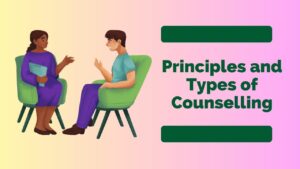Guidance and counselling are two distinct but related processes aimed at helping individuals achieve personal growth and overcome challenges. While both involve helping people understand their emotions, behaviours, and choices, they differ in terms of their goals, approaches, and techniques. Understanding the difference between guidance and counselling is essential in determining the appropriate form of support for individuals seeking help
Guidance is the assistance given to an individual to help him, to adjust to himself, to others and to his own environment. In this way, guidance is a process of all-around development.
Counselling refers to professional services provided to an individual who is facing a problem and needs help to overcome the problem. Counselling is considered an integral part of Guidance. The process of Counselling helps an individual to find the solution to a problem and also helps in the overall development of an individual.
Difference Between Guidance and Counselling in Tabular Form
Guidance and counselling differences in tabular form for b.ed are as follows:-
| Sl. No | Guidance | Counselling |
|---|---|---|
| 1 | The Meaning of Guidance can be understood as “to direct” or “to show the path” | Counselling refers to the professional advice provided by a counsellor or therapist to needy individuals so that they can overcome their personal and Psychological Problems |
| 2 | It is preventive in Nature | It is mostly remedial and curative in Nature |
| 3 | It is comprehensive and Extroverted | It is done in-depth and introverted |
| 4 | Guidance helps or assists the person to choose the best decisions | Counselling tends to change the perspective, to help him get the solution by himself or herself |
| 5 | The guidance gives clients ready answers | Counselling helps them come up with a well-informed solution |
| 6 | The guidance uses an external approach to tackle the issue at hand | Counselling uses the in-depth approach to establish the root cause of the problems before tackling it |
| 7 | Guidance is the best approach for tackling educational and career problems | Counselling is best employed in tackling socio-psychological and other personal problems |
| 8 | It can be provided by any person who is experienced in a particular field or expert | Counselling is mostly provided by Trained professional |
| 9 | This is less private or confidentiality is not guaranteed | This is mostly confidential |
| 10 | This can be given to individuals or in a group | This gives one to one |
| 11 | Guidance can be given from Schools, home; everywhere; from womb to tomb. | Counselling is given in a special setting conducive to giving and receiving help for interviewing |
| 12 | The main purpose of the guidance is to Optimum development of individual students for the ultimate development of the school | The main purpose of Counselling is to help individuals develop self-confidence and adjust to life strategies and schooling problems |
Also Read: Principles of Guidance
Meaning and Definition of Guidance
To Guide means to indicate, to point out, and to show the way. It means more than assisting. A man falls in the Street, we assist him to get up but we do not guide him unless we help him to go in a certain direction.
Guidance involves personal help given by someone. It is designed to assist a person in deciding where he wants to go?. What does he want to do? Or how he can accomplish his purpose. The focus of the guidance is on individuals, not on the problems. The main purpose of Guidance is to promote the Growth of an Individual in Self-direction.
The definitions of Guidance given by different Scholars are given Below-
- Ruth Strang: “Guidance is the process of helping every individual, through his own effort, to discover and develop his potentialities for his personal happiness and Social usefulness.
- Crow and Crow: “Guidance is Assistance made available by personally and adequately trained Men and Women to an individual of any age to help him manage his own life activities, develop his own point of view, make his own decision and carry his own burdens”
- Secondary Education Commission, 1952: “Guidance involves the difficult art of helping boys and girls to plan their own future wisely in the full light of all the factors that can be mastered about themselves and about the world in which they are to live and work”
Meaning and Definition of Counselling
Counselling is a dynamic process. It Aims the solution of clients’ problems. It is a process between the counsellor and the clients in which the Solution emerges as a joint venture of two.
The Term counselling meaning in Hindi is “upbodhan” developed by the Commission-Ministry of Education, Government of India. The Term “upbodhan” is derived from the word ‘bodh’ which means Knowledge. The root stem of the word is ‘budhi’ which means Intelligence. The Word “pramashdata’ is also frequently used in Hindi for Counsellor.
The meaning of Counselling becomes more clear through the definition given by Kother and Brown (2000) are-
- A profession with a history and set of standards, distinct from other related disciplines such as social work, psychology, and psychiatry
- An Activity that is designed to work with relatively normally functioning individuals who are experiencing developmental or adjustment problems
- A relationship, whether in a group, family or individual format, is constructed in a way to promotes trust, safety and change.
- Multidimensional dealing with human feelings, thoughts and behaviours, past, present, and future.
Other definitions are –
- Ruth Strang: “Counselling is a face-to-face relationship in which growth takes place in the counsellor as well as counselee”
- Carl Rogers: “Counselling is a process by which the structure of the self is relaxed in the safety of the relationship with the therapist, and previously denied experiences are perceived and then integrated into an altered self”
Key Difference Between Counselling and Guidance
The difference between Counselling and Guidance can be summarized as follows-
- Counselling is an inward analysis of the individual whereas guidance involves an external analysis of the individual and his problems.
- Counselling is an in-depth analysis and has a narrower perspective wherein the individual understands his problems in depth whereas guidance is a broader and more comprehensive approach.
- Counselling is generally provided for personal and social issues whereas guidance is usually provided for education and career-related problems.
- Counselling focuses on making the individual understand the problem and therefore, it brings about behavioural changes in the individual so that he can adjust to the problem. On the other hand, guidance focuses on finding a solution to the problems whereby the solution may bring about a change in the attitude of the individual.
- In Counselling, The counsellor is not the decision-maker while in Guidance the professional who offers guidance service is the decision-maker
- While counselling lays emphasis on both learnings as well as feelings, the guidance gives no place to feel and is more of an intellectual process.
- Counselling leads to what may be termed as self-discovery of the individual whereas guidance does not lead to self-discovery of an individual
Conclusion
We can conclude from the above discussion that, Guidance and counselling are both involved with the development of an individual who is facing and solving problems. Guidance and counselling depend on each other.
However, despite the fact that both guidance and counselling are aimed at helping an individual find solutions to his problems, there are some differences between the two, especially in terms of how the process is carried out and implemented.
Reference:
Frequently Asked Questions (FAQs)
What is the main difference between guidance and counselling?
The main difference between guidance and counselling is that guidance is more focused on providing information, direction, and advice to help individuals make decisions and solve problems, while counselling is more focused on exploring emotions, thoughts, and behaviors to help individuals understand and overcome personal challenges
How do the goals of guidance differ from the goals of counselling?
The goals of guidance are typically more specific and action-oriented, while the goals of counselling are often more exploratory and focused on personal growth and self-awareness
Can guidance and counselling be used interchangeably, or are they two distinct practices?
While there is some overlap between guidance and counselling, they are generally considered two distinct practices with different approaches and techniques.
What are the different techniques used in guidance and counselling?
Guidance techniques may include providing information, goal setting, problem-solving, and decision-making, while counselling techniques may include active listening, empathy, reflection, and exploration of thoughts and feeling
How can someone determine whether they need guidance or counselling, or both?
The need for guidance or counselling depends on the specific needs and goals of the individual. Someone may benefit from guidance for specific problem-solving, while someone may benefit from counselling to explore deeper personal issues.


